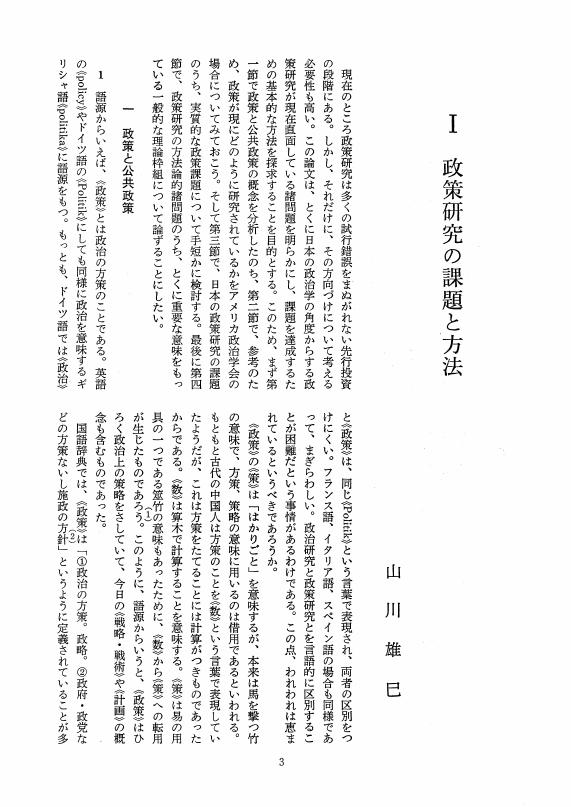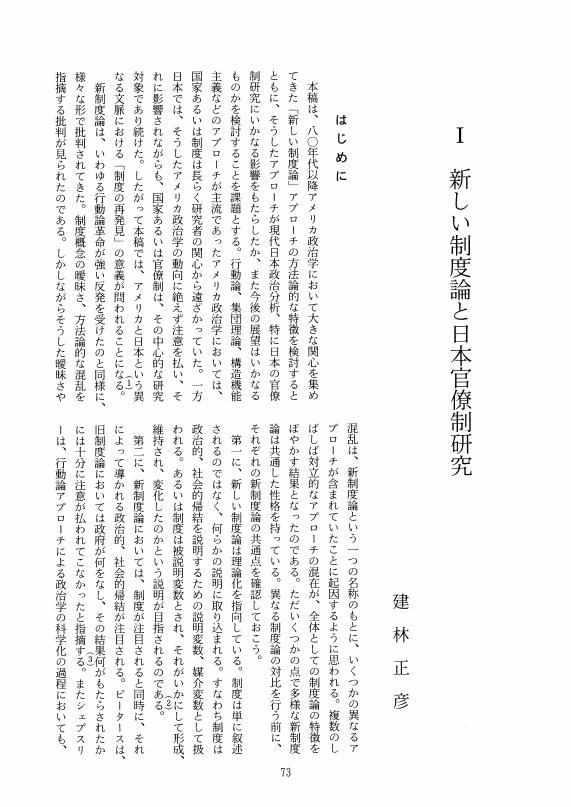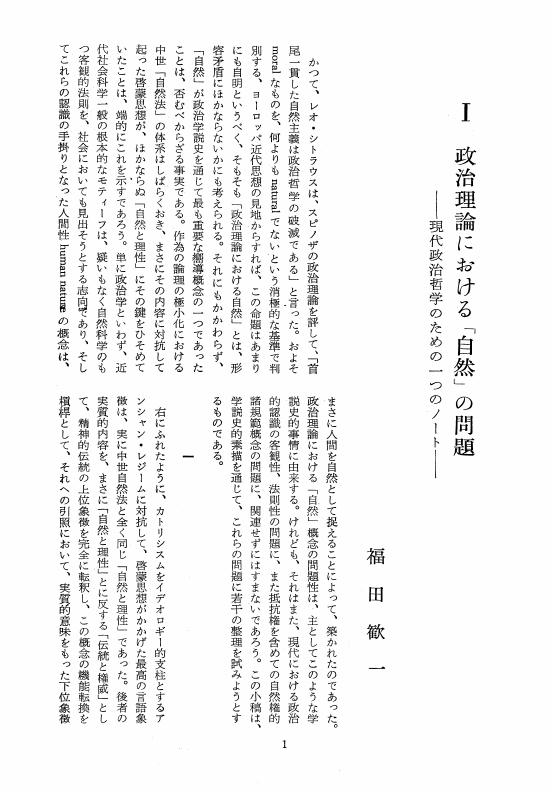2 0 0 0 OA 及び腰の介入と主権 ―オバマ政権期のリビア紛争とシリア紛争への対応を事例として
- 著者
- 五十嵐 元道
- 出版者
- 日本政治学会
- 雑誌
- 年報政治学 (ISSN:05494192)
- 巻号頁・発行日
- vol.70, no.1, pp.1_76-1_95, 2019 (Released:2020-06-21)
本稿は、主権概念を手掛かりに、国際社会における近年の介入の在り方について分析する。とりわけ、2010年代のリビア紛争とシリア紛争を事例として、オバマ政権期のアメリカによる介入政策を中心に検討する。リビアとシリアへの介入は、いかなる主権領域での、いかなる介入だったのか。本稿は、この時期のアメリカの介入政策が以下のような特徴を備えていたことを明らかにする。この介入政策は、 (1) 反政府勢力が結集し一体化するよう促し、 (2) 国際的な政治的承認を与えて段階的に外的主権を移行させ、 (3) 最終的に反政府勢力が現政権を倒し、新しい安定した統一政府 (国内主権) を樹立するよう助力するものである。本稿はこの政策をその特徴から 「及び腰の介入」 (reluctant intervention) と呼ぶが、これは現地勢力 (エージェンシー) の特質にその成否を依存するものだった。リビアとシリアの事例は、アフガニスタン戦争とイラク戦争後の世界で、欧米諸国が選択可能な介入政策の限界を示唆している。以下では、介入と主権についての先行研究を概観し (第1節) 、主権概念をもとにリビアとシリアにおける介入の特徴を明らかにする (第2節、第3節)。そして、最後に結論と示唆について論じる。
2 0 0 0 OA インドネシアにおける「犯罪との戦い」
- 著者
- 本名 純
- 出版者
- JAPANESE POLITICAL SCIENCE ASSOCIATION
- 雑誌
- 年報政治学 (ISSN:05494192)
- 巻号頁・発行日
- vol.60, no.2, pp.2_70-2_86, 2009 (Released:2013-02-07)
Indonesia is widely regarded as a hotbed of transnational violent crime in Southeast Asia. Terrorists and criminal rings have developed cross-border networks rooted in Indonesia. These ‘non-state actors’ quickly emerged as major concerns for post-Suharto governments, posing serious threats to the national security and economy. In response, various ‘wars on crimes’ have been initiated in the name of combating these threats. This article aims to elucidate the politics behind the making of these ‘wars’ by examining the ‘war on drugs’ led by the police (and the national narcotics agency) and the ‘war on terrorism’ orchestrated by the army. I argue that the threat is undoubtedly real, but war campaigns are designed to promote a political strategy of instrumentalizing the threat of transnational violent crime. With this strategy, both the police and the army were able to deflect criticism, reclaim ground lost during the democratization movement, and articulate this revanchism in the legitimizing vernacular of ‘global wars.’ In this sense these security actors are hijacking the ‘violence of non-state actors’ as a Trojan horse to regain power, build budgets, strengthen institutions and undermine reform pressures.
2 0 0 0 OA 戦後日本政治学における「ラスキ・ブーム」の位相
- 著者
- 大井 赤亥
- 出版者
- JAPANESE POLITICAL SCIENCE ASSOCIATION
- 雑誌
- 年報政治学 (ISSN:05494192)
- 巻号頁・発行日
- vol.60, no.2, pp.2_225-2_245, 2009 (Released:2013-02-07)
Harold Laski was once a popular political theorist in postwar Japanese politics. This paper examines the ‘Laski boom’ in the 1950s by comparing three Japanese political scholars: Masao Maruyama, Yoshihiko Seki, and Yasuzo Suzuki. While Maruyama depicts Laski as a consistent thinker, Seki stresses Laski's waver in his theory of state and liberty. Meanwhile, while holding a Marxist perspective, Suzuki sincerely accepts Laski's individualism and his theory of liberty. Through the comparison, we shall comprehend that Maruyama and Suzuki similarly appreciate Laski's political ambivalence between western democracy and communism. However, this paper also suggests a curious irregularity that Maruyama was attracted to Laski's gradual commitment to communism, and that Suzuki learned liberal theory of right from Laski. In conclusion, Laski's dilemma was also the shared dilemma of Maruyama and Suzuki, and this paper proves the ‘Laski boom’ in postwar Japanese politics as the intellectual cross-point where these political scholars intersected.
- 著者
- 石川 葉菜
- 出版者
- 日本政治学会
- 雑誌
- 年報政治学 (ISSN:05494192)
- 巻号頁・発行日
- vol.64, no.2, pp.2_181-2_207, 2013 (Released:2017-02-01)
The purpose of this study is to understand welfare reduction in the United States. Previous studies have focused on the Personal Responsibility and Work Opportunity Reconciliation Act of 1996, and treated the enactment as a primary factor that led welfare policy change. It is true that the reform is important for welfare policy because it started the Temporary Assistance to Needy Families program which replaced Aid to Families with Dependent Children (AFDC). However, little is known about welfare reduction programs implemented by State governments despite the fact that more than 48% of AFDC recipients were under those programs in 1995. Therefore, the objective of this article is to show the reason why State governments began to conduct their own welfare reduction programs. In addition, this study also attempts to explain why the number of such programs increased, and to demonstrate why the scale of such programs became larger and larger. This article focuses on the Section 1115 of the Social Security Act (Waiver Authority). Basically, State governments did not have flexibility in establishing eligibility requirements. Waiver Authority is the exception that gave States flexibility in establishing eligibility requirements. Using archival materials from presidential libraries, this study will explain critical juncture that determines state-level welfare policy change.
2 0 0 0 OA 日本官僚制の事案決定手続き
- 著者
- 大森 彌
- 出版者
- JAPANESE POLITICAL SCIENCE ASSOCIATION
- 雑誌
- 年報政治学 (ISSN:05494192)
- 巻号頁・発行日
- vol.36, pp.87-116, 1986-03-28 (Released:2009-12-21)
- 被引用文献数
- 2
2 0 0 0 OA 包摂/排除をめぐる現代デモクラシー理論
- 著者
- 山田 竜作
- 出版者
- JAPANESE POLITICAL SCIENCE ASSOCIATION
- 雑誌
- 年報政治学 (ISSN:05494192)
- 巻号頁・発行日
- vol.58, no.1, pp.1_143-1_162, 2007 (Released:2012-02-22)
So-called “radical democracy” has been concerned with problems of inclusion and exclusion, discussing difference, identity or citizenship. Now radical democracy seems to be divided into two models, agonistic and deliberative. Chantal Mouffe strongly criticizes deliberative democracy through insisting conflict as a fundamental element of “the political”. On the other hand, Iris Young, whose democratic theory is not simply labelled as agonistic or deliberative, conceptualized inclusive democratic model which can be bound on Mouffe’s. Both of them reject the essentialist idea of identity and acknowledge the fact that the constitution of “we” needs the determination of “they”. Mouffe’s idea of “adversary” and Young’s recognition of communication as “struggle” show that democratic dialogue can be a non-violent conflict in a public sphere. Such a conflict should be a type of inclusion because any identity cannot exist without others. The acknowledgement of changeableness of self-identity or self-interest seems to require what Young called “reasonableness” as “hearing the other”, which is not based on particular culture (e. g., white male) nor contain any notion of the common good which might oppress diversity. This can meet Mouffe’s emphasis upon a “practice of civility” which is based on Michael Oakeshott’s notion of societas.
2 0 0 0 OA J. ロックにおけるプライドと市民社会(文明社会)
- 著者
- 中神 由美子
- 出版者
- JAPANESE POLITICAL SCIENCE ASSOCIATION
- 雑誌
- 年報政治学 (ISSN:05494192)
- 巻号頁・発行日
- vol.59, no.1, pp.1_263-1_282, 2008 (Released:2012-12-28)
‘There is something troubling in this type of case, in that the desire for honour, command, power and glory usually exist in men of the greatest spirit and most brilliant intellectual talent. Therefore one must be all the more careful not to do wrong in this way,’ Cicero said in On Duties referring to Julius Caesar. Agreeing with him, John Locke tries to tame the dangerous aspect of ‘the desire for honour, command, power and glory,’ that is, human pride. However he sees this passion as indispensable to human freedom and therefore a free civil society, in contrast to Thomas Hobbes, who attributed the cause of the Civil War to this passion. In Some Thoughts Concerning Education, Locke outlines a free civil society on the basis of human pride. In a polite and civilized society where the ‘Law of Opinion or Reputation’ prevails, human pride can be moderated and cultivated into public spirit based on individual autonomy and freedom. For Locke, civil society is not merely a counterpart to absolute monarchy, but also a basis of human civility, that is, a civilized society.
2 0 0 0 OA 「一票の格差」をめぐる規範理論と実証分析
- 著者
- 粕谷 祐子
- 出版者
- 日本政治学会
- 雑誌
- 年報政治学 (ISSN:05494192)
- 巻号頁・発行日
- vol.66, no.1, pp.1_90-1_117, 2015 (Released:2018-06-10)
- 参考文献数
- 64
In Japan, malapportionment—the high level of disparity in the size of the population, and thus the weight of votes, across electoral districts—has been a national concern for several decades. Through a review of both normative theories of representation and comparative empirical studies related to the legislative malapportionment, this article identifies two problems in the ways this issue has been addressed in Japan. First, the measurement method used in most Japan-focused studies (the “max-min ratio”) is inappropriate, impeding the effectiveness of reform attempts to date. Alternative measurement methods such as the Loosemore-Hanby index should be used. Second, while most studies adopt a narrow focus in arguing for rectifying malapportionment for the sake of political equality, comparative empirical studies indicate that doing so may lead to other undesirable results such as partisan gerrymandering and lower voter turnout. This article provides a novel and comprehensive framework for possible institutional reforms based on theories of representation.
2 0 0 0 多元主義からイデオロギー対立へ:―大嶽秀夫の政治学とその変容―
- 著者
- 酒井 大輔
- 出版者
- 日本政治学会
- 雑誌
- 年報政治学 (ISSN:05494192)
- 巻号頁・発行日
- vol.67, no.1, pp.1_185-1_207, 2016
<p>大嶽秀夫の政治学の特徴について, 従来の日本政治学史研究では, ①多元主義, ②実証主義的・自然科学的な方法, ③戦後政治学と大きく相違するもの, として理解されてきた。また, 彼の方法の時間的変化を捉えていないなど, 一面的であった。しかし1980年代以降の大嶽の変化は, ①~③のイメージの再考を迫るものである。本稿は, 彼の80年代以降の実証研究の内容にも立ち入って, 彼の方法や理論枠組の変化を検証する。大嶽は既に1970年代当初から, 影響力の遮蔽性やパースペクティブの概念により, 多元主義の弱点の克服を試みていた。そして80年代には, イデオロギー対立の枠組により, 構造的対立や政治潮流のサイクルをその分析の中心とした。こうした変化は, 多元主義の枠組からの移行であるとともに, 政策過程分析に思想史的方法を導入するなど, 戦後政治学の方法を継承するものであった。</p>
2 0 0 0 OA 現実主義と構成主義
- 著者
- 西村 邦行
- 出版者
- 日本政治学会
- 雑誌
- 年報政治学 (ISSN:05494192)
- 巻号頁・発行日
- vol.62, no.1, pp.1_229-1_246, 2011 (Released:2016-02-24)
Having emerged as a criticism of the realist International Relations theory (IR), constructivism has usually been considered to entail certain liberal tendencies. Recent studies, however, not only advocate its potential affinity with realism; they even advance the thesis that realism-and classical realism in particular-is inherently constructivist because of its anti-positivist epistemology. This understanding of the two theories potentially conflicts with the widely-accepted understanding of the disciplinary history of IR, according to which the development of IR is depicted as realism's progress toward a “scientific” theory. Reexamining the relationship between realism and constructivism along with their places in the disciplinary history of IR, it proves that IR has developed not in a linear way; it has rather circled around the same epistemological issue. From this insight, the present article draws suggestions for the future development of IR theorizing.
2 0 0 0 OA 日本の南極への関与1910-1963
- 著者
- 友次 晋介
- 出版者
- 日本政治学会
- 雑誌
- 年報政治学 (ISSN:05494192)
- 巻号頁・発行日
- vol.64, no.1, pp.1_360-1_380, 2013 (Released:2016-07-01)
- 被引用文献数
- 1
The Imperial Japanese Government before WWII maintained its deliberate indifference to the claim repeated by Lieutenant Nobu Shirase for Japanese territorial right over Antarctica. Finding this inhabitable terrainno economic value at least for the short term, the prewar Japanese government focused on preventing other countries' exclusive dominion and retaining the nation's access to the future use of the continent. Such prewar political tradition was inherited by the postwar Japanese government under the new framework of San Francisco Peace Treaty. As the potential values of Antarctica grew along with the technological advancement of equipment and increasing possibility of the use of nuclear energy, it became more rational for Japan to secure the “open door” policy in which any country would not be excluded from Antarctica. Japan's policy towards the South Pole in this period implicitly contained a political realism as opposed to its expressed idealism and reflected the added influence of scientific and technological development, symbolized by nuclear energy, in the international dynamism.
2 0 0 0 OA 現代グアテマラにおける政治暴力の変容
- 著者
- 狐崎 知己
- 出版者
- JAPANESE POLITICAL SCIENCE ASSOCIATION
- 雑誌
- 年報政治学 (ISSN:05494192)
- 巻号頁・発行日
- vol.60, no.2, pp.2_87-2_107, 2009 (Released:2013-02-07)
The Commission on Historical Clarification in Guatemala (CEH) organized by the United Nations based on the Peace Agreement signed by the Guatemalan Government and the URNG, recognized that the Army and other agents of the Guatemalan State, inspired by the Doctrine of National Security, committed acts of genocide against the Maya people. The CEH named three mutually-dependent “structural” or “historical” causes of genocide: economic exploitation, racism and political authoritarianism. In this article, the analytical framework composed by the combination of four types of violence, (1) Direct political, (2) Structural, (3) Symbolic, and (4) Everyday forms of violence, is used to find out the continuing structure of the state violence which lead to genocide, as well as the changing forms and expressions of the political violence in the aftermath of genocide, focusing on the political impact of the act of “naming genocide” and the “privatization of the violence.”
2 0 0 0 OA 政策研究の課題と方法
- 著者
- 山川 雄巳
- 出版者
- 日本政治学会
- 雑誌
- 年報政治学 (ISSN:05494192)
- 巻号頁・発行日
- vol.34, pp.3-32, 1984-03-30 (Released:2009-12-21)
2 0 0 0 OA 新しい制度論と日本官僚制研究
- 著者
- 建林 正彦
- 出版者
- 日本政治学会
- 雑誌
- 年報政治学 (ISSN:05494192)
- 巻号頁・発行日
- vol.50, pp.73-91, 1999-12-17 (Released:2009-12-21)
- 著者
- 半澤 朝彦
- 出版者
- 木鐸社
- 雑誌
- 年報政治学 (ISSN:05494192)
- 巻号頁・発行日
- vol.2008, no.1, pp.340-342, 2008
2 0 0 0 OA 「制度改革」の政治学
- 著者
- 森 正
- 出版者
- 日本政治学会
- 雑誌
- 年報政治学 (ISSN:05494192)
- 巻号頁・発行日
- vol.57, no.2, pp.60-82,264, 2006 (Released:2010-04-30)
- 参考文献数
- 106
In this article, the potential of “practicable science, ” which is the new trend in Japanese politics in the 21st century, is being discussed and examined, focusing on a series of researches on Japan's political reforms.There have been two major trends or academic tendencies in the discussions of the political reforms. One is the attitude of political researchers who express strong criticism on political practices and propose actual policies actively participating in decision making processes. The other is the trend where certain distance is kept from actual political practices but they clarify the political actors' behavior at micro level, the changes of political phenomena, and the consequences through an empirical analysis. Both trends spread rapidly during the period.The new wave of Japanese political science research in the 21st century will bridge these two trends and respond to the proposition of “practicable science.” Policy proposals, empirical analysis, and normative discussions represented in public philosophy need to share functions and cooperate consciously while complementing each other without excluding others. It will be indispensable in establishing “practicable science, ” the new trend in Japan's political science research.
2 0 0 0 OA 人道的介入における政策決定者と軍人のコミュニケーション
- 著者
- 小松 志朗
- 出版者
- 日本政治学会
- 雑誌
- 年報政治学 (ISSN:05494192)
- 巻号頁・発行日
- vol.63, no.2, pp.2_421-2_443, 2012 (Released:2016-02-24)
- 参考文献数
- 13
This paper examines three cases of humanitarian intervention (Bosnia, Kosovo, and Libya) to show that intervening parties face challenges concerning the effectiveness of it. The analytical framework for this inquiry consists of ‘the relationship between the use of force and diplomatic negotiations’. The specific challenges are as follows: there are difficulties in defining the proper use of force in relation to diplomatic negotiations for a resolution of political conflict within a intervened state, and those are due to the uncertainty of communication between policymakers and the military within intervening parties; a gap between the use of force and diplomatic negotiations causes the uncertainty; and the gap has at least two variations, ‘the gap between means and end’ and ‘the gap between different ends’. The latter type of gap is especially noticeable since it reflects the trend of the time, the rise of legitimacy of humanitarian intervention.
2 0 0 0 OA 政治人類学
- 著者
- 前田 康博
- 出版者
- 日本政治学会
- 雑誌
- 年報政治学 (ISSN:05494192)
- 巻号頁・発行日
- vol.27, pp.183-201,en8, 1977-03-31 (Released:2009-12-21)
Comparative-primatologically, Gestalt of human society has the methodological indeterminacy, because of his peculiar anthropological ενεργεια-dominating-δυναμιζ-complex: Political Integration in the development.Political Integration is one thing, Social Integration is the other: the latter is naturally given due to each bio-behavioral characteristics of each genus; the former, to be artificially and specific anthropologically produced through the mutually intermediating formation of both social productivity and Dominance-Subjugation category.The Relationship of Dominance-Subjugation is, however commonplace it may seem, the organizational-historical category sui generis of human society, the uncritically generalized application allover non-human spheres of which is quite anthropomorphological error.But, Dominance must be institutionalized, logically: because of the necessity of feed-back for its own survival, and socio-physically: because of the socio-physical υλη of Dis-Communicative Cybernetical Control of Dominance itself. In fact, the social possibility of political resistance depends upon the socio-physical reality of dis-communicative resistance effect.Behavioral-functionally speaking, any kind of social activity is, in each way, some Dis-Communicative Cybernetical Control Matrix, formed and developed with and in the formation and development of the organizational-historical category of Dominance-Subjugation.Now, the optimal control of Dis-Communicative Cybernetics at the optimal Dis-Communicative degree is to be achieved, not so much positivistically, as dialectically: neither verifiable nor falsifiable, but only shifting the responsibility of verification to another.Accordingly, the production of the social values in Dis-Communicative Cybernetical Control Matrix cannot help dialectically transforming itself into the production of the social non-values as well, accompanied and emphasized by the constant possibility of shifting the responsibilities, which is never seen in non-human society upon Social Integration only.Nevertheless or just therefore, Political Integration as the condition of the possiblity, of human society, neither yet completely established nor yet sufficiently evolved even in such form as modern sovereign state, is the most fundamental political problem.Behaviorism, taking Political Integration for granted too much, has been concerned only with ενεργεια of human society, which remains methodologically to be analyzed in the framework of ενεργεια-dominating-δυναμιζ-complex.
2 0 0 0 OA 政治
- 著者
- 河合 秀和
- 出版者
- 日本政治学会
- 雑誌
- 年報政治学 (ISSN:05494192)
- 巻号頁・発行日
- vol.30, pp.230-239, 1981-09-30 (Released:2009-12-21)
- 参考文献数
- 8
2 0 0 0 OA 政治理論における「自然」の問題-現代政治哲学のための一つのノート-
- 著者
- 福田 歓一
- 出版者
- 日本政治学会
- 雑誌
- 年報政治学 (ISSN:05494192)
- 巻号頁・発行日
- vol.13, pp.1-18, 1962-05-14 (Released:2009-12-21)




